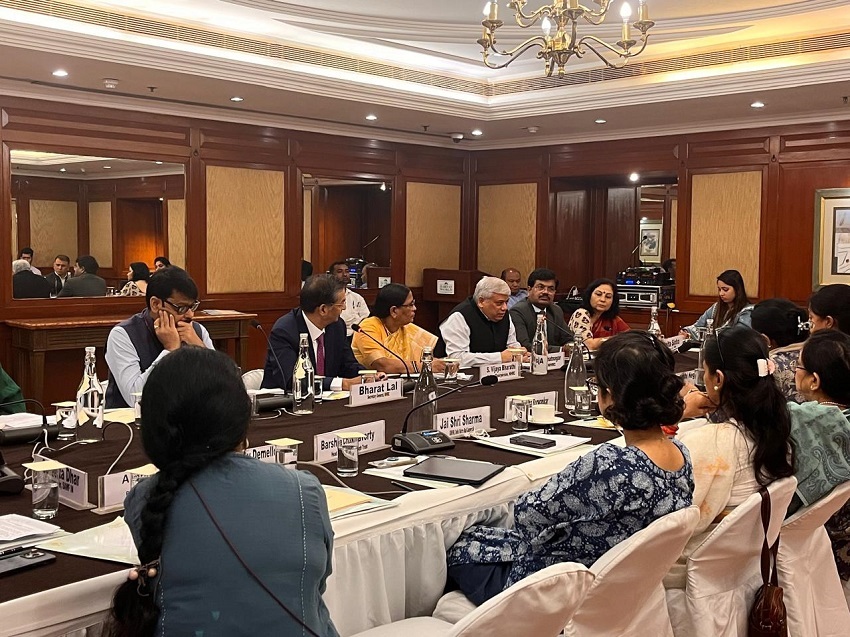On September 9, the National Human Rights Commission (NHRC) of India concluded its national symposium on Women’s Safety at Work & Public Spaces in New Delhi. NHRC Acting Chairperson Smt. Vijaya Bharathi Sayani emphasised the need for a holistic approach to address women’s safety, stressing the importance of strengthening existing laws and holding perpetrators accountable.
The symposium suggested safety and social audits of cities and institutions, gender sensitisation at all levels, and collaboration with professional institutions and organisations. NHRC Secretary General Shri Bharat Lal highlighted the challenges faced by women, especially those between 18-30 years, in the workforce and public spaces. Director General Shri Ajay Bhatnagar emphasized the need to address unequal power dynamics and involve men and boys in making society safe for women. Joint Secretary Smt. Anita Sinha stressed the need for collective prevention efforts to address the trauma faced by women.
Representatives from various ministries, national commissions, and police reflected upon several initiatives that have been taken by the government to ensure women’s safety in the workplace and public spaces. Some of the initiatives discussed include the Nirbhaya Fund, Mission Shakti, the Safe City Project, SHE-Box 2.0, and increased surveillance by police through CCTV cameras, lighting of dark spots in the city, gender sensitization programmes at the school and college level, and other similar programmes.
Some of the suggestions among others that emanated during the discussions were as follows;
- Safety and social audits of cities and institutions need to be carried out to get a better idea about the lags and issues that currently exist in terms of ensuring women’s safety when they enter the workplace and public spaces, preferably in collaboration with professional institutions and organizations;
- Better implementation of laws is needed to make sure that policies translate into tangible outcomes to improve the safety of women both at home, and outside;
- Have gender sensitization at all levels including schools, colleges, workplaces, top management of all major organizations, as well as in law enforcing systems, to adopt a preventive approach towards women’s safety with the help of civil society;
- Media in all its manifestations also needs to have guidelines for reporting crimes against women;
- Concentrated efforts need to be made to encourage bystander intervention in reporting crimes;
- As a society, the issue of women’s safety must be seen as a collective responsibility of all. It is imperative to collaborate productively rather than reacting once a major incident has occurred;
- Ensure all workplaces with working and proactive Internal Complaints Committees (ICC) to make women feel safe and comfortable.
The Commission will further deliberate upon more such inputs to finalise its recommendations. The symposium was attended by Ms. Meenakshi Negi, Member Secretary, NCW, Ms. Rupali Banerjee Singh, Member Secretary, NCPCR, Shri Pritam Yashwant Joint Secretary, MoWCD, Ms. Chhaya Sharma, Spl. Commissioner(Training), Delhi Police, Ms. Meeran Chadha Borwankar, former IPS, Ms. Kanta Singh, Deputy Representative, UN Women India, Shri Virat Bhatia, Managing Director, Apple India, Smt. Jai Shri Sharma, GM-HR, Delhi Metro Rail Corporation, Shilpa Lavania, VP-Human Resources, Invest India, Kiran Bishnoi, Sr AVP – Legal, Invest India, Prof. Ritu Gupta, Professor of Law at National Law University Delhi, Ms. Suneeta Dhar, Co-founder SAWF IN, Ms. Barsha Chakravorty, Head of Media, Breakthrough Trust, Ms. Amrita Thakur, Project Manager, Jagori, Ms. Poulomi Pal, Programme Specialist – EVAW, UN Women India.
Related:
Uttar Pradesh has highest number of cases “closed by the NHRC without reason”: NHRC data

